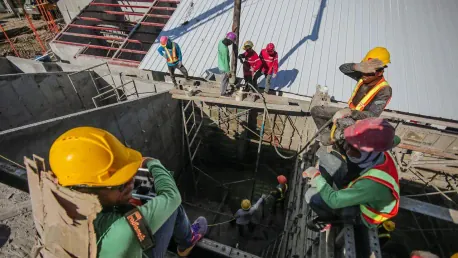An alarming instance of corruption has come to light involving several contractors and companies who were allegedly paid over N167 billion by 31 Ministries, Departments, and Agencies (MDAs) in Nigeria for various projects that were never executed. This situation came to public attention through the 2021 audited report by the Office of the Auditor-General of the Federation. SERAP (Socio-Economic Rights and Accountability Project) has called on President Bola Tinubu to take immediate and decisive action against the implicated entities to address this significant breach of public trust.
Call for Transparency and Accountability
SERAP’s Demand for Public Disclosure
SERAP urges President Tinubu to instruct the Minister of Finance and Coordinating Minister of the Economy, Olawale Edun, and the Accountant-General of the Federation, Oluwatoyin Sakirat Madein, to publicly disclose the identities of the contractors and companies involved. This call for transparency includes publishing the names of company shareholders and other individuals who might have ownership interests, alongside details of the projects and the amounts collected by each contractor. Transparency in this matter is crucial not only to address the current issue but also to prevent any future misuse of public funds.
Transparency is viewed as a powerful deterrent to corruption in the use of public funds. When the details of transactions are publicly available, it becomes significantly harder for corrupt practices to go unnoticed. By exposing these corrupt contractors and companies, the potential for fraudulent activities in the future may be greatly reduced, ensuring that public funds are utilized effectively and efficiently. Addressing these corruption allegations would help prevent and combat waste, fraud, and abuse in managing public funds. The long-term goal is to foster a culture where accountability is the norm, and such malpractices are not tolerated.
Concrete and Punitive Measures
Prosecution and Recovery of Funds
SERAP insists on the involvement of the Attorney General of the Federation and Minister of Justice, Mr. Lateef Fagbemi, SAN, together with appropriate anti-corruption agencies, to ensure that those implicated face justice. Among the advocated measures are the prosecution of the contractors and companies involved, accompanied by a public naming and shaming strategy. Furthermore, there is a demand for the guaranteed recovery of the looted N167 billion to be returned to the treasury. These steps are seen as essential to addressing the gravity of the situation and restoring public confidence in the government’s ability to manage public resources.
The emphasis on prosecuting and recovering misappropriated funds is not simply punitive but serves as a critical deterrent to others who might consider engaging in similar corrupt activities. Setting a precedent that corruption will be met with severe consequences, including legal prosecution and financial penalties, is essential to curbing further instances of corruption. Transparency and accountability are foundational to democracy and governance, and Nigeria must uphold these principles to ensure meaningful progress and development. The recovery of public funds is also crucial for enabling the government to invest in essential public goods and services that benefit the citizenry.
Deterrence and Good Governance
By taking decisive action against those implicated in this scandal, the government signals that corrupt practices will not be tolerated. This not only helps deter future occurrences but also promotes a culture of good governance. When public officials and contractors know that corrupt behavior will result in severe punitive measures, it creates a deterrent effect, reducing the likelihood of future embezzlement. Transparency and accountability should be ingrained in the governance structures to ensure that public funds are utilized for their intended purposes.
SERAP’s advocacy for naming and shaming the involved contractors underscores the critical role of deterrence in managing public resources. This public exposure serves as a powerful tool in making corruption less appealing, as the reputational damage can have long-lasting repercussions for the individuals and entities involved. Additionally, it bolsters public confidence when the government visibly takes steps to address corruption. Ensuring that there are established mechanisms for transparency and punitive measures contributes to building a resilient governance framework, essential for Nigeria’s socio-economic development.
Systemic Corruption and Mismanagement
Revelations from the 2021 Audited Report
The 2021 annual audited report underscores the gravity of fraudulent activities within MDAs. Particularly disturbing is the acknowledgment that the Nigerian Bulk Electricity Trading Plc alone paid N100 billion for unexecuted projects. Such large-scale mismanagement of funds highlights the systemic nature of corruption within government agencies. Other implicated MDAs, including the Nigerian Correctional Service, the National Pension Commission, the Federal Medical Centre in Bida, and the Federal Ministry of Youth and Sports Development, among others, further illustrate the widespread nature of these corrupt practices.
The report reveals how substantial sums of public money are systematically being misappropriated through fraudulent contracts. The nature of these transactions implies widespread collusion between government officials and the benefitting contractors, creating an entrenched culture of corruption without accountability. This culture of corruption further widens the inequality gap, depriving the majority of Nigerians of access to essential public goods and services, aggravating poverty, and stalling socio-economic development. Addressing these issues is critical to ensuring that public resources are used effectively to improve the lives of Nigerians.
Widespread Collusion and Culture of Corruption
The deeply rooted culture of corruption within Nigeria’s MDAs is evidenced by the pervasive fraudulent contracts and misallocation of public funds. With government officials and contractors colluding in these schemes, the result is a significant loss of trust in public institutions. This collusion not only facilitates the embezzlement of funds but also creates an environment where corruption becomes normalized and difficult to eradicate. Such systemic corruption undermines the effectiveness of governmental agencies and compromises the delivery of public services, contributing to widespread disenchantment and skepticism among the populace.
The widespread collusion between officials and contractors creates a cycle of corruption that is challenging to break. This collusion undermines the principles of transparency and accountability, making it difficult to hold individuals accountable for their actions. The impact of this pervasive corruption is far-reaching, affecting the provision of essential services like healthcare, education, and infrastructure. As public funds are diverted away from their intended purposes, the majority of Nigerians are left without access to critical public goods and services, contributing to increased poverty and social inequality. Overcoming this entrenched culture of corruption requires comprehensive and sustained efforts from both the government and civil society.
Impact on Nigeria’s Development
Grand Corruption and Developmental Challenges
The prevalent theme of misappropriation and lack of transparency highlights grand corruption as potentially being at the root of many of Nigeria’s developmental challenges. Transparency and accountability in government expenditure are paramount to improving public trust and ensuring socio-economic growth. When funds meant for development projects are misappropriated, it hinders progress and exacerbates the country’s numerous challenges, including poverty, inadequate infrastructure, and poor public services. By exposing these corrupt practices, more robust steps can be taken towards fostering good governance and safeguarding public resources.
Addressing the issue of grand corruption is essential for Nigeria’s development. When corruption is allowed to thrive, it siphons off resources that could be used to improve education, healthcare, infrastructure, and other critical sectors. This, in turn, affects the quality of life for millions of Nigerians and hampers the country’s ability to achieve sustainable development. Transparency and accountability are key components in building a robust and effective governance framework that can drive socio-economic growth and improve public trust. By tackling corruption head-on, Nigeria can lay the groundwork for a more prosperous and equitable society.
Advocacy for Systemic Reforms
A deeply troubling instance of corruption has emerged, involving several contractors and companies who allegedly received over N167 billion from 31 Ministries, Departments, and Agencies (MDAs) in Nigeria for various projects that were never completed. This egregious situation was revealed through the 2021 audited report by the Office of the Auditor-General of the Federation. In response to this massive breach of public trust, the Socio-Economic Rights and Accountability Project (SERAP) has urged President Bola Tinubu to take swift and firm action against the implicated entities. The call for accountability highlights the pressing need for transparency and honesty in public service to rebuild public confidence and ensure that such lapses do not occur again. President Tinubu’s decisive response would not only address this significant breach but also set a precedent for zero tolerance toward corruption, reinforcing the integrity of Nigeria’s governance system.









